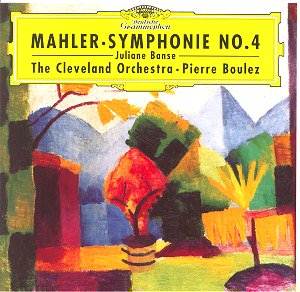MAHLER: Symphony No.4
 Juliane Banse (Soprano) The
Cleveland Orchestra Conducted by Pierre Boulez
Juliane Banse (Soprano) The
Cleveland Orchestra Conducted by Pierre Boulez
 Deutsche Grammophon 463
257-2
Deutsche Grammophon 463
257-2

The Boulez Mahler cycle continues, never failing to be of interest. I'm equally
sure this latest instalment, bringing the great French conductor to Mahler's
most popular work, will also divide opinions just as the others have, maybe
more. Ever the clear-eyed interpreter of Mahler, Boulez barely acknowledges
the availability in the score of the many expressive opportunities other
conductors use to the full. At the fourth bar of the first movement, for
example, where others have been known to almost bring proceedings to a halt,
Boulez's mere Gallic shrug in the direction of Mahler's marking (and the
performance tradition) itself stands out. An expressive opportunity more
conspicuous in the breach rather than the observance, I think. This general
attitude will be one of this recording's most obvious fingerprints as the
same sharpness of focus continues through the first movement where a brisk,
clear, neo-classical effect is aimed for and achieved. This impression is
assisted by a care for balancing every section of the orchestra so nothing
protrudes to rock the boat. To some this will be evidence of coldness, to
others it will be a refreshing "back to basics" that takes us further into
the origins of this work as representative of Mahler's "Wunderhorn" period.
Not least with the trumpet figure Mahler called the "Kleiner Appel" and later
recalled at the start of his Fifth Symphony. Here this crucial appearance,
half way through the movement, is buried by Boulez within the texture rather
than trying to override it which it sometimes does in other versions where
conductors try to make a link to a work Mahler had not even considered when
he wrote this one.
The second movement continues Boulez's general approach but deepens the music
with superb woodwind solos from the Cleveland players caught by the fine
recorded balance. What we hear in the third movement is remarkable for its
lack of pretension and its stress on classical poise. I was even reminded
of the slow movement of the Schubert String Quintet at the start, so fine
is Boulez's sense of stillness achieved without an especially slow overall
tempo. In the first main variation notice too the balance of oboe against
horn and then the surprisingly expressive quality that emerges chaste on
the strings. Another point to listen for is how the timpani are never in
danger of overwhelming the more passionate, climactic passages. So Boulez's
watchwords of "balance", "poise" and "transparency" really do reveal details
others can miss. The aftermath of the central climax of the slow movement,
where the gates of heaven are flung open by Mahler, is especially fine in
this respect and also structurally accentuates the arc-like design of the
movement.
Juliane Banse sings beautifully in the last movement, making no attempt to
impose herself too much as some singers make the mistake of doing. Of course
some will say she should sound more child-like, just as Mahler intended,
but she's not alone in concentrating on the notes and words and I was delighted
by her contribution as it's beautifully tailored to the rest of the performance
which is, after all, as it should be.
For many this new recording will be too clear-eyed, too lacking in character,
too tidy a performance of this lovely work. For me it represents Boulez's
Mahler at its best and shows a certain degree of warmth that's crucially
tempered by that classical poise to give another refreshing view of a work
we might think we are all too familiar with. As so often with Boulez in Mahler,
this is not a leading choice. Rather it's a first-rate alternative to more
familiar versions by Kletzki, Horenstein and Szell, to name but three. No
praise can be too high for the Cleveland Orchestra or the Deutsche Grammophon
recording.
Reviewer
Tony Duggan
Performance:

Recording:

See also Tony Duggan's comparative reviews
of the Mahler Symphonies

![]()